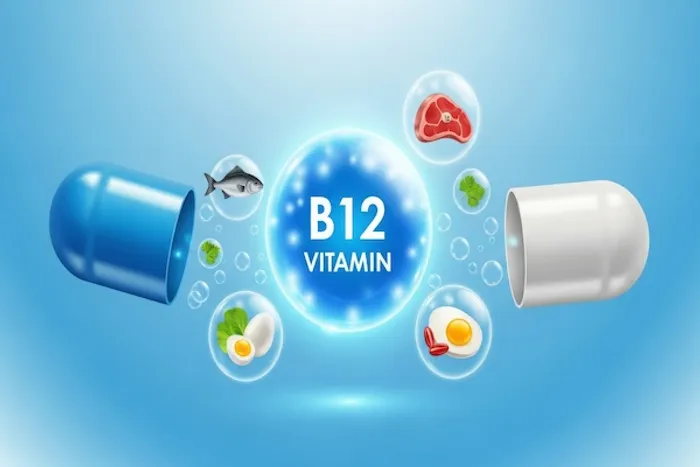High Vitamin B12 Levels: Causes, Symptoms, and How to Manage Them
Worried about high vitamin B12? Learn what your blood test results mean, common causes, symptoms to watch, and safe steps to restore vitamin balance.


Introduction
It’s common to hear conversations about low vitamin B12, but seeing a high vitamin B12 level in your blood test results can be unexpected. This result may feel confusing, especially if you don’t take supplements or injections. A high reading doesn’t always indicate a problem, but it does have clinical significance depending on context. This guide explains what a high result can mean, the most frequent causes, what symptoms to watch for, and how to work with your healthcare professional to bring your vitamin levels back into balance.
What Vitamin B12 Does — and Why It Matters
Vitamin B12 (cobalamin) plays several essential roles in the body. It contributes to red blood cell production, nerve cell maintenance, and DNA synthesis. B12 occurs naturally in animal foods such as meat, poultry, eggs, fish, and dairy, and it is added to various fortified products like certain plant milks, cereals, and nutrition drinks. The liver stores vitamin B12, sometimes in amounts sufficient for years, which is why deficiency can develop slowly. Vitamin B12 is water‑soluble, meaning that excess amounts not needed by the body are usually filtered out through urine. Because of this, toxicity from dietary sources is uncommon.
Consult a Top Nutritionist for Personalised Advice
What Does a High Vitamin B12 Blood Test Result Mean?
The high Levels of vitamin B12 may mean:
- Laboratory ranges differ based on the testing method. A result considered “high” means your level is above the upper end of the reference range provided on your blood report. Always refer to the range listed on your specific report and discuss context with your clinician.
- A high result alone does not diagnose any disease. Vitamin B12 levels can rise temporarily after supplements or injections. When levels remain persistently elevated — particularly without supplement use — further assessment may be recommended to look for an underlying cause.
Common Causes of High Vitamin B12 Levels
The common causes of high vitamin B12 are:
1) Supplements and Injections
- High‑dose tablets, multivitamins, and B12 injections are the most common reasons for elevated B12. Supplement forms are designed to boost levels quickly, especially when treating deficiency.
- After an injection, blood levels can remain elevated for several weeks because your body absorbs what it needs and stores the rest in the liver. This type of increase is expected and does not usually require intervention.
2) Fortified Drinks and Foods
- Some fortified foods and beverages are formulated to provide high amounts of B12. Energy drinks, protein shakes, and certain breakfast cereals may contribute to higher levels, particularly if consumed daily.
- B12 may be listed on food labels as cyanocobalamin or methylcobalamin. Reviewing nutrition labels can help identify hidden intake.
3) Liver and Kidney Conditions
- The liver acts as the primary storage site for vitamin B12. In liver diseases such as hepatitis, fatty liver disease, or cirrhosis, stored B12 and B12‑binding proteins may be released into the bloodstream, contributing to elevated levels.
- Kidney conditions may reduce the kidneys’ ability to filter and clear vitamin B12 and its binding proteins, also leading to higher measured levels.
4) Blood Disorders
- Certain conditions affecting blood and bone marrow — including some leukaemias and myeloproliferative disorders such as polycythaemia vera — can cause elevated B12 due to increased production of B12‑binding proteins by white blood cells.
- In these cases, elevated B12 is not the cause but a marker prompting further investigation.
5) Other Medical Conditions
Persistently high vitamin B12 has been observed in some cancers and in certain chronic inflammatory conditions. This does not mean B12 causes these illnesses; rather, elevated levels may reflect the activity of binding proteins or changes in how the body processes B12.
Get Your Health Assessed
Are There Symptoms of High Vitamin B12?
Let us see what are the symptoms of high vitamin B12
- Most people with high vitamin B12 do not experience symptoms related to the vitamin itself.
- As a water‑soluble nutrient, the body typically eliminates excess B12, and there is currently no established upper intake limit for healthy individuals.
- If symptoms occur, they usually relate to the underlying cause of the elevated level. Depending on the condition being investigated, symptoms may include fatigue, night sweats, unexplained weight loss, jaundice, or abnormal bruising.
- Some people may experience temporary side effects after high‑dose injections, such as mild headache, nausea, or local skin reactions. These are generally short‑lived.
How To Manage High Vitamin B12 and Restore Vitamin Balance
If your test results show elevated vitamin B12, here is a straightforward plan to review with your clinician:
1) Confirm the Result
- Ask whether you should pause B12‑containing supplements and fortified drinks before retesting.
- Repeating the blood test can help differentiate between a temporary spike (for example, after an injection) and a persistent elevation.
2) Review All Sources of Vitamin B12
- Supplements may include individual B12 tablets, multivitamins, prenatal vitamins, or B‑complex products.
- Fortified drinks and foods may include plant‑based milks, cereals, nutrition shakes, and energy drinks.
- Injections may be administered to treat a deficiency or as part of certain medical treatments.
- Sharing a complete list of supplements, frequency, and doses with your clinician helps them assess total intake.
3) Don’t Stop Prescribed Medical Treatment on Your Own
If you take vitamin B12 as part of a treatment plan for a diagnosed deficiency, continue as directed. Once levels normalise, your clinician may adjust your dose or switch you to maintenance therapy.
4) Ask About Additional Tests If Levels Stay High Without Supplements
Your clinician may recommend further evaluation, such as:
- A complete blood count (CBC) to assess red and white blood cells and platelets.
- Liver function tests (AST, ALT, bilirubin) and kidney function tests (creatinine, eGFR).
- Further tests guided by your history.
- If needed, metabolic markers like methylmalonic acid (MMA) or homocysteine can indicate how well your body is using B12.
5) Make a Monitoring Plan
Discuss the best timing to recheck your levels. Monitoring helps identify trends rather than relying on a single reading.
6) Smart Supplement Use
- Avoid very high‑dose supplements unless recommended for medical reasons.
- Nutrition labels may show extremely high percentages of the daily recommended amount. Many people do not require large doses to maintain adequate levels.
7) Nutrition Strategies for Vitamin Balance
- Include B12‑containing foods if you consume animal products.
- If you are vegan or have conditions affecting absorption, consult a clinician or dietitian to determine suitable B12 sources.
When To See a Doctor Promptly
Seek medical advice sooner if elevated vitamin B12 is accompanied by:
- Unexplained weight loss, night sweats, or fever
- Persistent or unusual fatigue, bruising, or bleeding
- Yellowing of the skin or eyes (jaundice), dark urine, or pale stools
- Ongoing or severe abdominal discomfort
- Any symptom that feels unusual or is getting worse
What Your Results Don’t Tell You
The results may not reveal:
- A high vitamin B12 level doesn’t necessarily mean you have too much B12 stored in your tissues.
- One test cannot determine the cause; your clinician interprets the result in the context of diet, medical conditions, and other test findings.
Key Takeaways
The key takeaway points are
- Elevated vitamin B12 results are most often linked to supplements or recent injections.
- Persistently high readings without supplements can indicate liver, kidney, blood, or inflammatory conditions, so follow‑up evaluation may be recommended.
- Most people do not experience symptoms from high B12 itself.
- Work with your clinician to review sources, confirm results, and assess contributing factors.
Conclusion
High vitamin B12 on a blood test result can be surprising, especially if you aren’t taking supplements. In many cases, the cause is simple to address. Evaluating sources of B12, confirming the test result, and monitoring trends over time can provide clarity. Persistent high levels, particularly without supplementation, may warrant further investigation to rule out medical conditions. By maintaining open communication with your clinician and making informed choices about supplements and nutrition, you can support a healthy balance and feel confident about your wellbeing.
Consult a Top Nutritionist for Personalised Advice
Consult a Top Nutritionist for Personalised Advice

Ms. Sushma Jaiswal
Dietician
42 Years • M.Sc.(Food & Nutrition)
Bengaluru
Swasthya Nutrition, Bengaluru

Ms. Neelanjana J
Dietician
5 Years • Bsc., Msc. Nutrition and Dietetics specialised general weight management, PCOS/PCOD weight loss and Diabetes management. A clinical dietitian with 4+ year experience specializing in evidence-based, result-oriented nutrition therapy. I have extensive experience in weight loss, thyroid management, PCOD/PCOS, weight gain, and diabetes & prediabetes care. My approach is personalized, practical, and sustainable—focusing on helping individuals achieve long-term lifestyle change rather than quick fixes. I work closely with clients to understand their medical history, lifestyle, and goals, and then design customized diet plans that support hormonal balance, metabolic health, and overall wellbeing. My goal is to make nutrition simple, realistic, and effective—so you see measurable results and feel your healthiest self.Auther in Health benefits of jackfruit (Artocarpus heterophyllus Lam.) seeds: A review (2023) The Pharma Innovation Journal Co- Auther in Malnutrition in Women: A review (2023) The Pharma Innovation Journal. Highfield Level 3 in HACCP. Highfield Level 4 International Award in Food Safety Managment
Bengaluru
Apollo Clinic, JP nagar, Bengaluru

Ms. Soma Saha
clinical nutrition
17 Years • B.Sc. - Home Science (Food & Nutrition), M.Sc. - Home Science (Food & Nutrition)
Kolkata
Dr Utsa Basu Clinic, Kolkata
(50+ Patients)

Ms Mohanapriya J
clinical nutrition
12 Years • MSc Clinical Nutrition
Chennai
Apollo Sugar Clinics , Greams Road, Chennai

Ms. Samapti Maity
Dietician
16 Years • MSc. (Clinical Nutrition & Dietitics), NDEP, Course in Maternal Infant Young Child Nutrition.Diploma in Sports Nutrition, Diploma in Diabetic educator, FODMAP Specialist
Kolkata
BIENETRE CLINIC, Kolkata
Consult a Top Nutritionist for Personalised Advice

Ms. Sushma Jaiswal
Dietician
42 Years • M.Sc.(Food & Nutrition)
Bengaluru
Swasthya Nutrition, Bengaluru

Ms. Neelanjana J
Dietician
5 Years • Bsc., Msc. Nutrition and Dietetics specialised general weight management, PCOS/PCOD weight loss and Diabetes management. A clinical dietitian with 4+ year experience specializing in evidence-based, result-oriented nutrition therapy. I have extensive experience in weight loss, thyroid management, PCOD/PCOS, weight gain, and diabetes & prediabetes care. My approach is personalized, practical, and sustainable—focusing on helping individuals achieve long-term lifestyle change rather than quick fixes. I work closely with clients to understand their medical history, lifestyle, and goals, and then design customized diet plans that support hormonal balance, metabolic health, and overall wellbeing. My goal is to make nutrition simple, realistic, and effective—so you see measurable results and feel your healthiest self.Auther in Health benefits of jackfruit (Artocarpus heterophyllus Lam.) seeds: A review (2023) The Pharma Innovation Journal Co- Auther in Malnutrition in Women: A review (2023) The Pharma Innovation Journal. Highfield Level 3 in HACCP. Highfield Level 4 International Award in Food Safety Managment
Bengaluru
Apollo Clinic, JP nagar, Bengaluru

Ms. Soma Saha
clinical nutrition
17 Years • B.Sc. - Home Science (Food & Nutrition), M.Sc. - Home Science (Food & Nutrition)
Kolkata
Dr Utsa Basu Clinic, Kolkata
(50+ Patients)

Ms Mohanapriya J
clinical nutrition
12 Years • MSc Clinical Nutrition
Chennai
Apollo Sugar Clinics , Greams Road, Chennai

Ms. Samapti Maity
Dietician
16 Years • MSc. (Clinical Nutrition & Dietitics), NDEP, Course in Maternal Infant Young Child Nutrition.Diploma in Sports Nutrition, Diploma in Diabetic educator, FODMAP Specialist
Kolkata
BIENETRE CLINIC, Kolkata
More articles from Vitamin Deficiency
Frequently Asked Questions
What level is considered “high” for vitamin B12?
Reference ranges differ between labs. A result higher than the upper limit listed by your laboratory is considered high. Your clinician will help interpret this in context.
Can my diet alone cause a high B12 level?
This is unlikely. While animal foods and fortified products contain B12, excess amounts are normally eliminated. Persistently high levels are more commonly linked to supplements or medical conditions.
Is a high vitamin B12 level dangerous?
A single high result is rarely harmful. Persistent elevation without supplements may indicate an underlying condition and should be reviewed with your clinician.
Should I stop my B12 supplement if my level is high?
Don’t stop prescribed supplements without advice. If taking over‑the‑counter supplements, ask whether the dose should be adjusted.
Do I need to fast for a vitamin B12 test?
Fasting is usually unnecessary, although some clinicians prefer avoiding supplements shortly before testing.


.webp)


